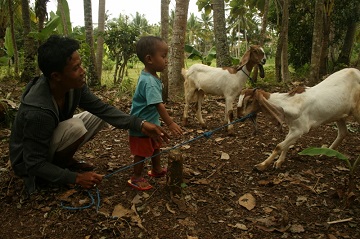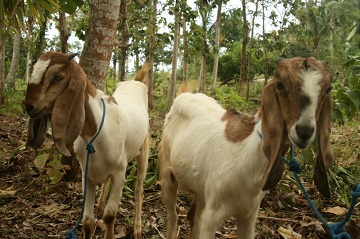Août 15, 2013 – Amis de la Fondation des parcs nationaux de (FNPF) nouveau projet de microfinance de l'élevage caprin vise à améliorer la vie d'un groupe de villageois sur l'île de Nusa Penida.
Nous avons embarqué 50 chèvres à Nusa Penida, juste à côté de la côte de la partie continentale, la maison denotre sanctuaire d'oiseaux, en Juin. Les chèvres, un mélange d'hommes et de femmes, ont été prêtés à 23 subsistence farmers in the island’s south.

Ce père et fils sont parmi ceux du village de Saren sur l'île de Nusa Penida, juste à côté de la côte de Bali continentale, qui bénéficiera de notre nouveau projet de chèvre de la microfinance.
Chèvres sur un prêt de deux ans
“Nous avons prêté les agriculteurs de ces chèvres de race – they can then rear the offspring and eventually sell the animals for their meat,” said FNPF’s CEO and Founder Dr Bayu Wirayudha. “The idea is to provide the farmers with an extra income source and so help improve their standard of living.
“For each goat they are given the farmers must return a new goat to us – of the same size and sex – in two years’ time. The project is designed so that the goats are given to groups of farmers, rather than to individuals, so there’s collective responsibility for their wellbeing.”
Home of our bird sanctuary
FNPF, with the backing of the island’s villages turned Nusa Penida into a one-of-a-kind sanctuary for birds in 2006. For more than seven years we have been working on the island to rebuild numbers of the Bali étourneau, one of the most worlds’ most endangered birds and Bali’s emblem. Back when we started there were believed to be fewer than 10 birds surviving in the wild in Bali, today there are estimated to be more than 100 living on the island.
“We believe conservation projects have to be holistic to be effective, and so must involve local communities. On Nusa Penida we run development programs designed to improve community wellbeing, including projects, like this one, through which people learn about environmentally-friendly ways to make a living,” said Dr Wirayudha.
Changing livelihoods for locals
Made Sintu, one of the farmers benefiting from the project, has been looking after some of the goats for six weeks. Il a dit qu'il y avait beaucoup à nourrir les animaux et pour l'instant il n'a pas été difficile d'apprendre à prendre soin d'eux.
The Saren village farmer, who supports a wife and eight children, makes his living from farming a cow, chickens and pigs. He hopes his involvement in the project would help make his life a little easier.

Some of the 50 goats we have sent to Nusa Penida to help improve the livelihoods of Saren village farmers.
Rotary backing for project
Le projet de microfinance de chèvre est financé par leRotary Club de Bali Seminyak, qui a récemment visité Nusa Penida pour vérifier les progrès. “J'ai été surpris et impressionné par tous ces chèvres fantastiques cages (les agriculteurs ont construit) – I thought it would be more simple actually – I was very impressed,” said club member Peter Erni, qui coordonne le projet pour le Rotary. “C'est un programme intéressant.”
Le Rotary Club de Bali Seminyak finance également FNPF debourses pour les étudiants sur Nusa Penida et est cette année un don pour aider à gérer notre concours de recyclage d'art des élèves, partie de l'Indonésie célébrations de la Journée de l'Indépendance sur Nusa Penida ce mois.
Dr Wirayudha said if FNPF is able to secure further funding it hopes to extend the goat farming microfinance project to other villages on the island.
Si vous êtes intéressés à s'impliquer dans ce projet de microfinance s'il vous plaît contactez-nous auinfo@fnpf.org ou vous pouvez nous contacter par téléphone au +62 361 977 978.







